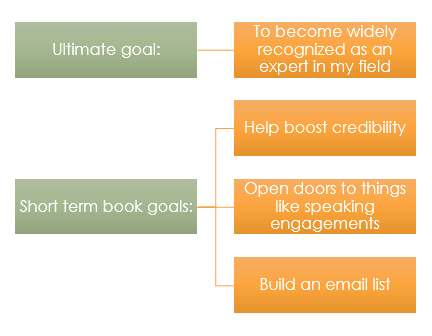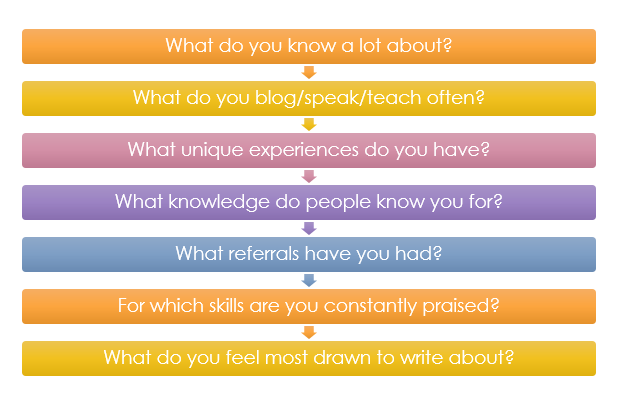Welcome to
Time to Finally Write Your BookHow to write & launch your book
Module One
Brainstorm Your Expert Book Idea
In this module we’ll look at setting your goals for your expert book, selecting your book topic, and writing your one-sentence defining description of your book.
Choose Your Goal(s) for Your Book
Before you start writing, you need to set a goal for your book, and know where it fits into your overall business. This gives you clarity on the purpose of your book, and helps you stay focused and motivated as you work towards finishing it.
For example, your big professional goal may be to become widely recognized as an expert in your field. Though it’s unlikely that your first book is going to achieve this by itself, it’s going to be one important part of the bigger picture of achieving your goal. State your big long-term goal, and then set your short-term, smaller goals for this book that will help you get there.
This could look something like:
- My ultimate goal: To become widely recognized as an expert in my field.
- My goals for this book, that will help me to achieve my ultimate goal, are:
- To help boost my credibility as an expert in my field
- To open doors to things like speaking engagements
- To build my email list

These goals don’t only serve as a focus and source of motivation, they will also influence things like your choice of marketing tactics. We will cover marketing in later modules but, for now, a brief example of this could be:
For the goal of building your email list, your marketing activities will need to be things that drive people to your website and then persuade them to sign up for your email list.
For the goal of helping to boost your credibility as an expert in your field, your marketing activities could include ways of increasing the visibility of both you and your book on LinkedIn.
Choose Your Book Topic
To write a book your audience needs and will buy, and which will show off your expert knowledge to its best advantage, you first need to choose the right topic. And to do that, you need to do some research into possible topics, and then narrow your results down to the best topic for you to write first.

Step 1: Brainstorm
Brainstorm ideas for your book topic by asking yourself these questions.

- What do you know a lot about?
- What do you blog about often? Or speak publicly about? Or teach to others? What do people consult you about?
- What experience do you have that you would say is unique to you? Something you feel you can write about with confidence, and have something different to add to or say about the current body of work available. Do you have a fresh perspective you can bring?
- What knowledge or expertise do other people already know you for? For example, are you the go-to person for advice about how to set up a blog with WordPress? Or how to write a business plan? Or as a life coach to other coaches?
- Think about the things people have recommended you for to others – what referrals have you had, for what knowledge and which skills?
- When you’ve received testimonials and feedback from clients or customers, for which skills or knowledge are you consistently praised?
- What do you feel most drawn to write about, and teach others about?
Write your ideas down. A pen and paper are fine for this, or simple bullet points in Word. Or you could create a mind map using something like Bubbl.us, XMind 8, WiseMapping, or FreeMind.
If you find you have a lengthy list of possible topics from your brainstorming in Step 1, use your judgment of the best topics and choose a small selection for your market research in Step 2. Think about what you already know about your audience, what problems they’re facing, and what they need to solve those problems. You should be able to come up with some topic ideas that you think will appeal to your would-be readers.
In the next step you’ll be moving on to researching the topics you chose above. You don’t want to have too many to research, so be selective here. But, do take note of your other ideas as they will be possible topics or inspiration for your future books.
Step 2. Research Your Book Topic
Carry out market research and test the market for your list of possible topics from Step 1.
Amazon. See what books already exist. Amazon is a great place to do this, especially as this is where you will be publishing your first digital book in this course. Do a search using keywords associated with your topic, and look at popular examples in your niche. You can drill down by category, then look at an individual book’s rank within a specific category to help gauge the popularity of its topic. You can also look at the Top 100 Paid books in your category to see what’s popular.
Is there a gap in the market – something that hasn’t been covered yet? It’s unlikely that you’ll find a totally untapped topic for a book, so it may be more judicious to look at popular book topics and consider how you can bring fresh perspective and new knowledge. Don’t be discouraged from writing about a topic because there are already a lot of published books. It’s possible to be visible on Amazon by choosing the right keywords and categories, getting a lot of positive reviews, and driving sales with a good marketing plan.
Readers’ reviews are potentially a good source of inspiration as they will often expose omissions in published books – things that readers were expecting to learn or discover from a book, but the book didn’t deliver.
If you find a popular overarching topic that interests you, is there potential there for a series of books that you could write? A series is excellent for making more sales and growing your credibility as an author.
Find out what your market wants. What are their pain points?
Carry out a survey on your blog, or in your Facebook group. You could suggest some topics based on your initial research, and also ask people to suggest their own topics.
Engage people in a discussion. Email your list and ask them if you were to write a book that solves their biggest problem, what would it be about? If you have an active Facebook group, ask the same question and start a discussion based on possible book topics. Ask them which books are they already reading, and whether they’re getting the answers they need.
Your Competitors. What books have your competitors published? It’s OK to publish something on a similar or even the same topic – especially if you feel drawn to it and know the topic extremely well. Your book will be unique in its combination of knowledge, experience, and perspective.
Quora. Head over to the Q&A site Quora.com, type in a search for your niche, and find out what sort of questions people are asking. You’ll find a wealth of book inspiration here – not only for your book topic, but also for the content to put in your book when you write it.
Keep a note of any subtopics and key content ideas you generate during your research into your main topic. This will be useful when you come to create your book outline in Module 3.
Step 3. Choose Your Topic
From your research in Step 1 and Step 2, create a shortlist of two or three good topics.
Ask yourself, which of those topics would best show off my expertise and meet the goals for my book?
Which topic do you know the most about and can write about without having to spend too much time researching?
Don’t get sidetracked by the idea of writing about the latest big thing. Writing a book is hard work, and if you choose something too difficult, you’ll lose motivation and the book won’t get written.
The aim is to choose a topic that is a combination of something you can and want to write about, that will showcase your expert knowledge and help you achieve your book goals, that you can get started on quickly, and that your audience will want to buy.
Step 4. Define
Write a short one-sentence description of your book that says who it is for, and states the problem your book solves for your potential readers. This gives you a sense of direction and focus when you are writing your book. Plus, it will also be useful when you come to market your book.
Your description could look something like this:
My book helps __________ (your target reader) to __________ (describe the problem your book addresses) so that they can __________ (describe the ultimate benefit to solving the problem).
Example:
My book helps health service providers to use social media platforms so that they can grow their business by increasing brand awareness, generating high-converting leads, increasing web traffic, and building relationships.
Learning Activity:
- Write down your goals for your book. Write your big, overarching professional or business goal, and the goals for this specific book that will help you achieve that big goal.
- Using the questions in Step 1 in this module, brainstorm ideas for your book.
- Decide which methods of market research you will carry out and what you’ll look for.
- Conduct your market research and record your results and notes in a separate notebook
- Using your research results from Step 1 and Step 2 in this module, choose your topic for your book.
- Write your defining statement for your book.
Discover Your Superpowers
Plain and simply put, you are unstoppable! The guides below are your blueprint to earning your cape and reaching your true potential.
In spite of how many times you’ve thought or even said out loud, “I’m only human,” Discover Your Superpowers: The Key to Unlocking Your True Potential will forever change the meaning of that phrase. Discovering or igniting your dormant superpowers will allow you to live your best life, and this book is just the resource you need to achieve it. Enclosed are tools, strategies and experiences shared by author Tamara Paul that will enable you to discover the superhero within, allowing you to take a quantum leap in multiple areas of your life.



